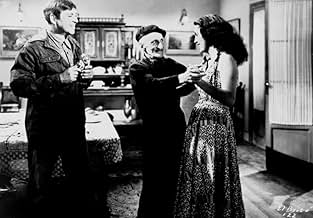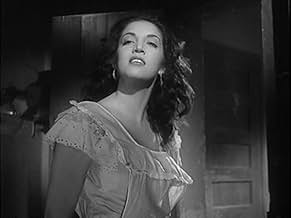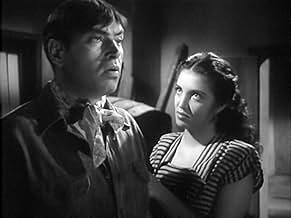Un joven que ayuda a echar a la gente pobre de sus casas, se enamora de una chica. Ella vive con su padre en el edificio a punto de ser demolido.Un joven que ayuda a echar a la gente pobre de sus casas, se enamora de una chica. Ella vive con su padre en el edificio a punto de ser demolido.Un joven que ayuda a echar a la gente pobre de sus casas, se enamora de una chica. Ella vive con su padre en el edificio a punto de ser demolido.
- Dirección
- Guionistas
- Elenco
- Premios
- 1 premio ganado y 2 nominaciones en total
- Meche
- (as Rosa Arenas)
- El Cojo - Tío de María
- (as G. Bravo Sosa)
- Vecina
- (sin créditos)
Opiniones destacadas
"El Bruto" is no exception and it is a strong combination of a surreal melodrama and political film which could also be viewed as a modern retelling of the Frankenstein's story. Pedro "El Bruto" is a young tough slaughterhouse laborer who is exploited by a tyrannical landowner who may be his father and to whom he is very loyal. He is eager to help Don Andres to evict the poor tenants form their houses that belong to Don Andres. Pedro is a simple man who was not used to think a lot and analyze the motivations of the others but he will learn and his eyes will open. Pedro will become a not so obscure object of desire of two women, passionate and strong-willed Paloma, the young wife of Don Andres and the kind and gentle Meche, whose father Pedro accidentally kills while doing the job for Don Andres. As is supposed to be in the melodrama, one of the women is scorned and hell hath no fury as she does and the inevitable ending is coming. The very last shot of the movie with its enigmatic irony is pure Bunuel - only he would finish the film the way he did.
The film follows an uninspired tale of eviction of tenants by Don Andres, and El Brudo - Pedro - is hired to rough em up, and stop those "revolutionaries" from stirring up trouble. Perhaps Bunuel was making a commentary about Franco's Spain with such references, but any analogy is lost in the mire of an all-too-predictable plot. The details are not really worth mentioning, on account of their banality.
What, then, saves this film from registering a 3 or worse on my scale? Well, while the film seems at first aggravatingly conventional, there are enough subversive digressions from the genre (beast-mollified-by-virtuous-beauty) that makes you rethink the point of the entire film. First of all, there's the matter of perspective - we are all used to seeing Film Noir heavies take the protagonist/troublemaker aside with a little "message" from the boss. This time, though, we are asked to sympathize with the heavy's side. Sure, it's been done elsewhere (The Godfather trilogy comes to mind), but not with, as in Armendariz's performance as Pedro, intensity reminiscent of Marlon Brando as Tennessee Williams' Stanley Kowalski.
Otherwise, a lingering question of motive remains. It is not a simple, beast-man changes his ways and saves the day story, because Pedro's motivation for change seems to be attraction to Meche, not benevolence towards the lowly tenants. Does that make him a selfish, animal man? Or does it actually reveal his humanity, above that of the loveless Don Andres and Paloma? In the end, Pedro doesn't change his nature, but a certain part of his nature - that of attraction - gets the better of him.
The final image of the film is also deliciously enigmatic: Paloma gazing - fearfully? anxiously? - at a dark hen that defies interpretation. Perhaps I missed a plot detail about that hen - was it the same one that was a gift from Pedro to Meche? then perhaps she is jealous - but more likely, it is a statement of rebellion against Paloma's otherwise static character type. She seems to be have been involved with some potent set pieces earlier (the flowers to be cut, representing tenants; the meat to be cut, representing the subtlety of seduction).
We are not meant to leave fully knowing or understanding either Paloma or Pedro (sadly, Meche remains 1-dimensional), and enough scenes are introduced that challenge our preconceptions about type characters that makes the story surprisingly compelling.
Buñuel explores his characteristic themes of lust , jealousy , cruelty, class differences , hypocrisy and corruption . This isn't a typical Buñuel film , though there are some symbolism but no surrealism . Interesting and thought-provoking screenplay by the same Luis Buñuel and his usual Mexican collaborator Luis Alcoriza , being efficiently produced by Oscar Danzigers . After his first French period working in which he directed his two greatest surrealist films , he disappeared below the radar in Mexico on a variety of ultra-low-budget films, few of which made much impact outside Spanish-speaking countries , though many of them are well worth watching ; one of them is this ¨Le Brute¨ or ¨El Bruto¨ . Buñuel was given a strict Jesuit education which sowed the seeds of his obsession with both subversive behavior and gritty human dramas , issues well shown in this picture . Pretty good cast gives fine acting ; it is formed by nice Mexican actors such as Pedro Armendariz as El Bruto , a bouncing to kick out a poor people from their houses , Katy Jurado as a satanic Femme Fatale and the innocent and virginal Rosa Arenas .
The motion picture was stunningly directed by Luis Buñuel who was voted the 14th Greatest Director of all time . This Buñuel's strange film belongs to his Mexican second period ; in fact , it's plenty of known Mexican actors . As Buñuel subsequently emigrated from Mexico to France where filmed other excellent movies . After moving to Paris , at the beginning Buñuel did a variety of film-related odd jobs , including working as an assistant to director Jean Epstein . With financial help from his mother and creative assistance from Dalí, he made his first film , this 17-minute "Un Chien Andalou" (1929), and immediately catapulted himself into film history thanks to its disturbing images and surrealist plot . The following year , sponsored by wealthy art patrons, he made his first picture , the scabrous witty and violent "Age of Gold" (1930), which mercilessly attacked the church and the middle classes, themes that would preoccupy Buñuel for the rest of his career . After his two avant-garde collaborations with fellow surrealist Salvador Dali , his career, though, seemed almost over by the mid-1930s, as he found work increasingly hard to come by and after the Spanish Civil War , where he made ¨Las Hurdes¨ , as Luis emigrated to the US where he worked for the Museum of Modern Art and as a film dubber for Warner Bros . He subsequently went on his Mexican period he teamed up with producer Óscar Dancigers and after a couple of unmemorable efforts shot back to international attention , reappearing at Cannes with ¨Los Olvidados¨ in 1951 , a lacerating study of Mexican street urchins , winning him the Best Director award at the Cannes Film Festival. But despite this new-found acclaim, Buñuel spent much of the next decade working on a variety of ultra-low-budget films, few of which made much impact outside Spanish-speaking countries , though many of them are well worth seeking out . As he went on filming "The Great Madcap" , ¨The brute¨, "Wuthering Heights", ¨El¨ , ¨Susana¨ , "The Criminal Life of Archibaldo De la Cruz" , ¨Robinson Crusoe¨ , ¨Death in the garden¨ and many others . His mostly little-known Mexican films , rough-hewn , low-budget melodramas for the most part , are always thought-provoking and interesting ; being ordinary screenwriter Julio Alejandro and Luis Alcoriza . He continued working there until re-establishing himself in Europe in the 1960s as one of the great directors . And finally his French-Spanish period in collaboration with producer Serge Silberman and writer Jean-Claude Carrière with notorious as well as polemic films such as ¨Viridiana¨ was prohibited on the grounds of blasphemy , ¨Tristana¨ , ¨The Discreet Charm of the Bourgeoisie" , of course , ¨ ¨Belle Du Jour¨ , with all the kinky French sex and his last picture , "That Obscure Object of Desire" .
Thus the movie does not set out dealing very directly with the unenviable role in relationships that women played in the 1950s, not under Franco in Spain, but in the Mexican society in which Bunuel lived at this point in his career. Instead, the movie makes a more specific comment on the state of the union as a whole, as is suggested in the line to Don Andres (the rich landlord who is throwing all of his poor tenants into the street), `Thank you, Don Andres. You're the pride of a country without people.'
At this point in the movie, one begins to try to make ties between Don Andres and Franco, Spain's oppressive dictator at the time the film was made (and also the reason that the movie could not have been made in Spain in 1952). Franco is something of a rich and oppressive landlord himself, although the movie does not spend much time on the idea of an all-powerful and enormously wealthy landowner.
As was the case in A Woman Without Love, the Brute very soon goes into the story of a woman who is constantly brought suffering by the men in her life, even if only indirectly. The movie starts off making a strong comment about the suffering of many at the hands of a small elite, and then it quickly explores an individual situation within the population. These are a typical group of poor people, and their efforts to prevent themselves from being thrown on the street and, more importantly, the efforts of their landlord to evict them, provide the conflict focused on in the rest of the film.
Don Andres hires a huge man from the slaughterhouse, a man who adores him since he has been a mentor for his entire life, and the man he hires is determined to strike fear into the hearts of anyone who would dare to stand against this wonderful man. There is a lot going on here that deals with superficial impressions, since Pedro, the Brute (played by Pedro Armendáriz, who, as an unfortunate side note, committed suicide in 1963), is completely determined to help Don Andres but then changes his mind entirely once he gets close to the people that he is sent out to scare into submission.
Pedro is a brute of a man, hence the title of the movie, but he faces the reality of what he is doing when he becomes close to the daughter of the man that he accidentally killed under his assignment from Don Andres. This bit of irony is the confliction of the martial law enforced by the powerful elite as it conflicts with the larger population, the humanity of which is too often overlooked. He was determined at the beginning to set the troublemakers straight, but it is not until he is forced to take shelter among them that he realizes who the real troublemakers are (`I may have done something wrong but I didn't know you then.').
It would seem that this portion of the film presents the harshness of an authoritarian regime as misdirected and even naïve rather than inherently evil, although it is equally likely (and, indeed, probably more so) that it is a message to those very regimes (specifically that of Franco) of the reality of their form of government. Brute is a strongman for the rich elite and then ends up getting help from them and even falling in love with one of them, at which point he changes his mind, no longer wanting Don Andres to have his way and for all of these people to be evicted. He has, in effect, been separated from his brutish side by his intermingling with the very people that he was sent out to oppress.
There is a great scene during the chase, by the way, that I just have to mention. At one point, when Pedro is running through the alleyways, there is a shot of him running in one direction, and his shadow, through trick lighting, clearly runs in a completely different direction, going down a different alleyway. At this point in the movie, Pedro separates from his darker side, turning toward helping the poor people that are being evicted. Just a little bit of trick lighting (a VERY common technique in black and white filmmaking) that really stood out to me.
¿Sabías que…?
- TriviaDuring filming, actor Pedro Armendáriz strenuously refused to wear short-sleeved shirts, claiming they were made for pedophiles.
- Citas
Pedro - El Bruto: You have such ways with me. It's true.
Paloma: Come and look. Here are your clothes, clean and mended. Fix yourself up a little. You always look so sloppy and your hair is always messy. And you show off with an open shirt.
Pedro - El Bruto: That's not true. I lost a button.
Paloma: I'll fix it. It's incredible. Such manliness and yet you're such a baby. You don't seem to be a real man. When Don Andrés scolds you,u you look for a back to hide behind. I could did laughing.
Pedro - El Bruto: Don't say that, ma'am. I love and respect him because he has known me since I was a baby. My mother was Don Pepe's maid. The old man. He was always good to us. He sent me to school, and would hit me if I did something wrong. But when he was in a good mood he gave me candy and allowed to listen to his clock. Somebody once said he was my father. I had a fight over it with some other kids. If he was my father... I'm sure he'd tell me. Don't you think?
Paloma: [El Bruto forces himself upon Paloma] Leave me alone. Let me go.
Pedro - El Bruto: I'll teach you to stop playing with me.
Paloma: You want me to call Andrés? You bastard! What did you think? That I'd allow you to touch me with your dirty hands?
Pedro - El Bruto: Forgive me. I thought that...
Paloma: What, idiot?
Pedro - El Bruto: That you liked me.
Paloma: But you forget something very important. That I have to be willing also.
Selecciones populares
- How long is The Brute?Con tecnología de Alexa
Detalles
- Tiempo de ejecución1 hora 21 minutos
- Color
- Relación de aspecto
- 1.37 : 1
Contribuir a esta página
























